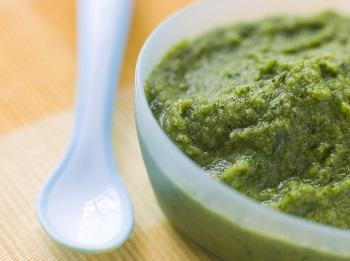 Giving your baby his first spoonful of solid foods is an exciting time! Many parents look forward to the day their little one takes their first bite of rice cereal, and in many cases, baby is just as eager! So how do you know if your baby is ready to transition to solids?
Giving your baby his first spoonful of solid foods is an exciting time! Many parents look forward to the day their little one takes their first bite of rice cereal, and in many cases, baby is just as eager! So how do you know if your baby is ready to transition to solids?
Here are a few tips for helping you introduce and successfully navigate feeding your baby solids.
Is my baby ready for solids?
As a general rule, most babies are ready to tackle solids between 4 and 6 months of age.
- Weight gain. According to the American Academy of Pediatrics, babies are typically big enough to consume solids when they reach about 13 pounds—or about the time they double their birth weight.
- Head control. Your baby must be able to sit up unsupported and have good head and neck control.
- Heightened curiosity. It may be time to introduce your baby to solids when they begin to take interest in the foods around them. Opening of the mouth, chewing motions and staring at your plate at the dinner table are all good indicators it’s time to give solid foods a try.
Getting started
To start, give your baby half a spoonful or less of one type of solid food. Generally it doesn’t matter which food is introduced first, but many parents begin with an iron-fortified rice cereal. Once they master one type of food, then you can gradually give them new foods.
Other foods, such as small banana pieces, scrambled eggs and well-done pasta can also be given to the baby as finger foods. This is usually around the time the baby can sit up and bring their hands or other objects to their mouth.
As your baby learns to eat a few different foods, gradually expose them to a wide variety of flavors and textures from all food groups. In addition to continuing breast milk or formula, you can also introduce meats, cereals, fruits and vegetables. It’s important to watch for allergic reactions as new foods are incorporated into your baby’s diet. If you suspect an allergy, stop using that food and contact your pediatrician.
Talk to your pediatrician for recommendations about feeding your baby solid foods. Your pediatrician can answer any questions you have about nutrition, eating habits and changes to expect as your baby embarks on a solid food diet.








